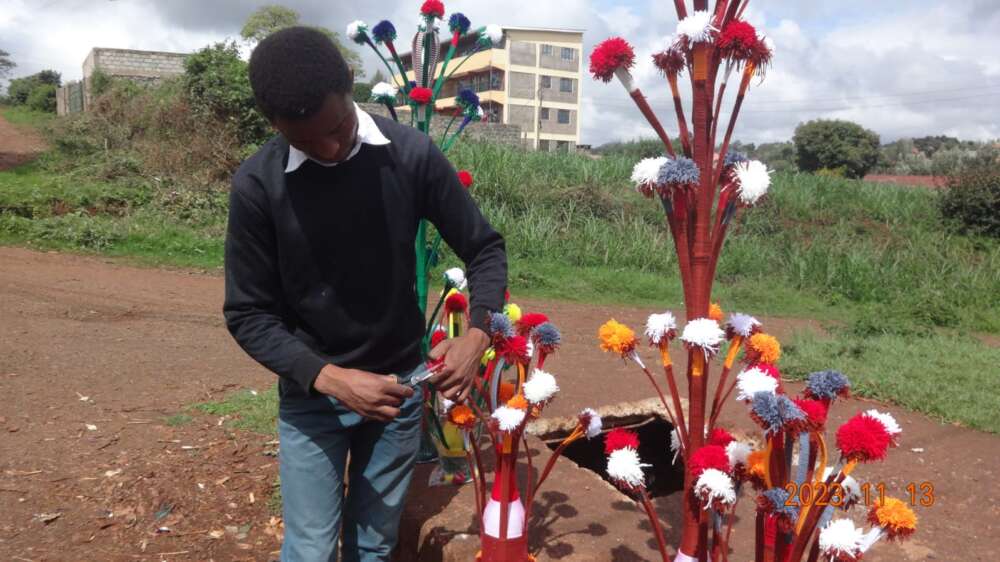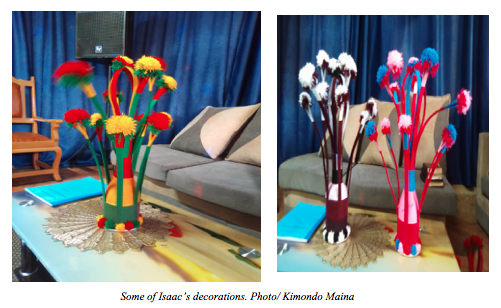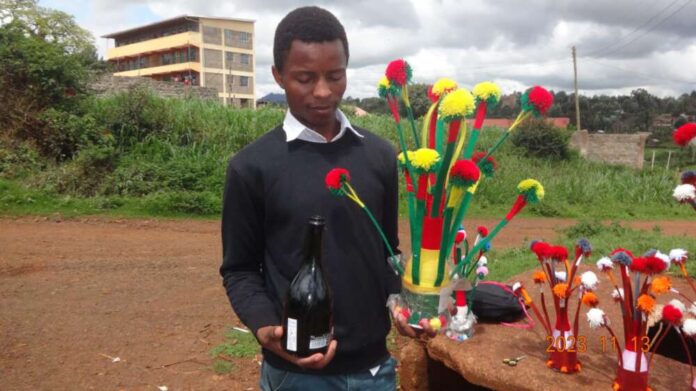By Kimondo Maina, DevReporter, Nyeri County

Key Highlights
- Upcycling as a solution to glass and plastic solid waste.
- A need for material recovery centres and waste segregation for easier recycling.
- Upcycling as a solution to glass and plastic solid waste.
- A need for material recovery centres and waste segregation for easier recycling.
The widespread use of glass bottles and plastic containers inflict environmental harm, jeopardising ecosystems, including wildlife. As carriers of consumption, disposing glass and plastic bottles often threaten landscapes, biodiversity, and human health.
In Kiamwathi Centre, Nyeri County, RB News interacted with the local community to find out what they deem as the right way to dispose glass and plastic bottles.
Mwangi, a shopkeeper, said: “The best way is by reusing or recycling, but instead, people burn or dispose of them in compost pits.”
On his party, Joseph, a youth, stated: “I sell my empty bottles to those in the recycling business.” For Rose, a resident, said: “Some recycle their bottles so that they do not pollute the environment.”
Used Glass and Plastic Bottles to Home Décor Items
Isaac King’ori, a Kiamwathi resident, turning glass and plastic bottle waste into home décor items. Photo/ Kimondo Maina
Meet Isaac King’ori Wambugu, a young man from Kiamwathi, Nyeri County, who has embarked on a transformative journey of upcycling used glass and plastic bottles. Motivated by a lack of employment after completing his studies, Isaac turned to upcycling, transforming used liquor and beverage bottles into stylish items as a pastime project.

Isaac King’ori tending to his flower decors. Photo/ Kimondo Maina
Isaac collects bottles from local dumpsites in Nyeri Town. “I visit several dumpsites in Nyeri County, I collect the materials I need to recycle, I clean and cut them into the preferred designs.”
Employment Creation
Through leveraging social media marketing, Isaac has transformed his hobby into a thriving business. This endeavour has become his daily bread, with prices ranging from Ksh. 350 to Ksh. 800 for small to medium decors, and Ksh. 2500 for large ones. Through his business, he can feed and sustain his young family.

Environmental Conservation
“I usually recycle eight glass bottles and 20 plastic bottles a day. This means that I usually collect more materials from the environment, that is environmental conservation.” Isaac stated.
Isaac’s efforts have been praised by his customers. Rose, commended him as a hardworking entrepreneur who is utilising waste products. “Isaac is a creative, hardworking man utilising waste materials to earn a living. I would urge the government to support such initiatives,” Rose said.
Commitment to Ending Plastic and Glass Pollution
Mr. Nyaga, the National Environment Management Authority (NEMA) Director in Nyeri County, acknowledges the problem posed by used bottles. He emphasises the need for material recovery centers to prevent overwhelming landfills and encourage waste segregation for more efficient recycling.
Kenya has demonstrated commitment to combatting plastic pollution through policies such as the 2017 ban on polythene bags and the 2020 prohibition of single-use plastics in protected areas.
In the Sustainable Waste Management Act of 2022, Kenya aims to inculcate responsible public behaviour on waste and the environment. In addition, Article 42 of the 2010 Constitution talks about sustainable waste management.
Isaac’s efforts are working in line with the Kenya Plastic pact in realisation of Kenya’s Vision 2030 and Sustainable Development Goal (SDG) goal no 12 on responsible production and consumption.
Isaac’s upcycling story points out the potential of individual initiatives, the power of community support, and the need for collaboration between entrepreneurs, governments, and environmental organisations in the ongoing battle against glass and plastic pollution.






